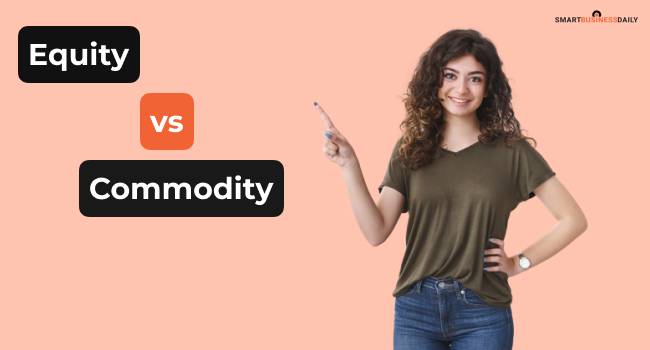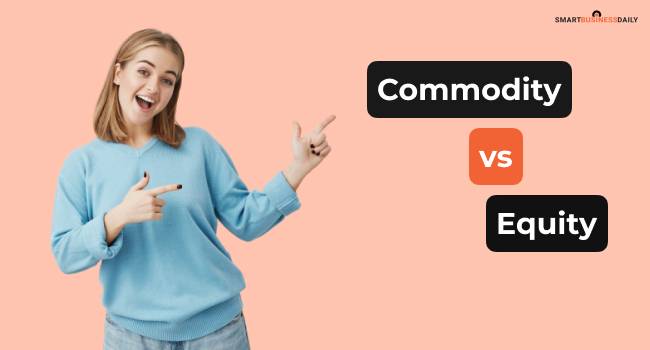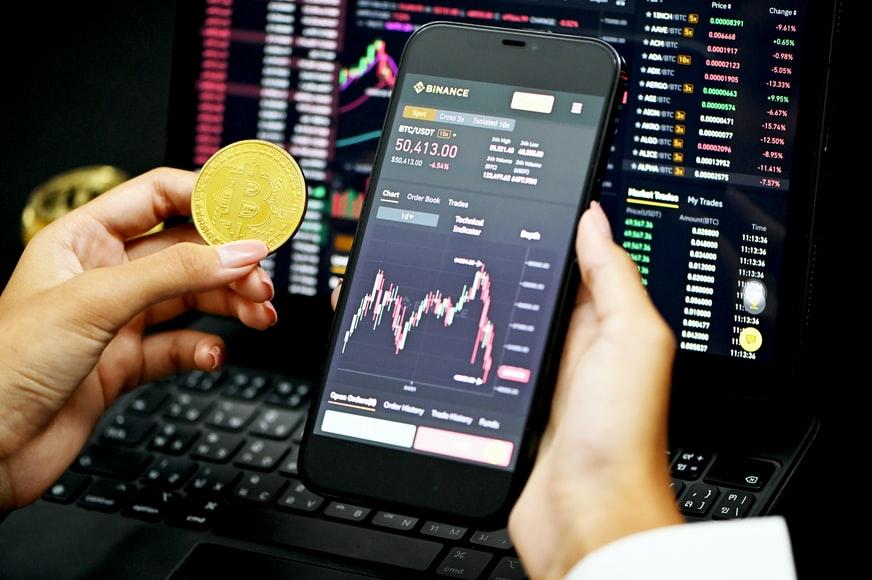Equity Vs Commodity- Know The Differences With Comparison Chart
29 January 2022
7 Mins Read

toc impalement
Commodity vs Equity! When it comes to any kind of asset building, Equity commodity is the two terms that you will hear too often. Yet, they are like the key elements of investing, whose knowledge you must master if you wish to proceed and succeed in the field.
But, for a new beginner, the concept might be slightly confusing. Especially if you want to understand the difference between the two, the meanings can blend in sometimes. In order to be a pro-investor, it is not just about knowing the meanings but also comprehending the comparison of equity vs Commodity.
In the excerpt below, you will get a broader idea about the equity and commodity meaning and an elaborate discussion on their differences. Additionally, you will also learn which one is best for your profit.
Equity Vs Commodity – All You Need To Know
Before we get into the main subject of equity vs Commodity, here are the important topics that need to be covered before.
- What Are Equity And Commodity?
- What Is Equity Future
- Types Of Commodity Market
- Equity To Commodity
What Is Equity?

If you are investing in a company through the stock market, then you are investing in a concrete asset right?. Now, what happens when the company decides to liquefy its entire asset. Do you lose your investment? No.
Being an investor and a shareholder, you have the privilege to receive an amount returned to you once the company asset is liquefied and all the debts have been paid.
Net Equity Calculation
The net calculation about the equity share that will be returned to you are,
Company’s Total Assets- Total Liabilities = Net Equity
The accounts of a shareholder which comes under the inquiry share are common stock, additional-paid in the capital, preferred stock, comprehensive earning. Since equity is technically the capital provided by shareholders to a company in its initial years, it is always adjusted and the subject of turn when the time comes.
This calculation will help us get a better understanding of equity vs Commodity.
What Is Equity Future?
Equity future is the long-term goal that is imposed on the parties signing the financial contract. Under this contract, both parties are obligated to buy or sell certain assets associated with the investment.
In Equity future, you are allowed to sell stocks without being a part of it. Also, another beneficial part of having an equity future contract is that they are evaluated every day by the end of the working hour.
What Is Commodity?

We must be well versed with the definition of Commodity individually before understanding equity vs Commodity.
In a simple economy, a commodity is something that is brought for the asset gain of an individual. It is then sold for the purpose of gaining profit. Commodities do not have the same price limit; they fluctuate with the changing time. Therefore, your Commodity can give you profit, but at times it can also be the cause of your loss.
The Commodity can be assets valued in all sectors: food, livestock, or other agricultural items. Or, even gold which is a tertiary item.
Basic commodities are grains and other agricultural food items. Other traditional commodities are financial products, including oil and natural gas.
Is Bitcoin A Commodity?
With the advent of the financial revolution in the last decade of the 21st century, Bitcoin, the digital currency, also known as the liquid gold, is one of the assets added to the list of commodities recently.
Therefore, Commodity is the first form of currency that is recognized in the world economy, even before fiat currency.
On the other hand, equity mostly deals with fiat currency. This is the first equity vs commodity difference in the definition of what is equity and Commodity.
Type Of Commodity Market

Before we quench our impatience to understand the difference between commodity and equity, here is another important piece of information about commodities you should definitely add to your investment knowledge basket.
There are several types of commodities; some of them are,
Metal: These include brass, copper, brass, and iron [they are the base metals]. Some of the noble metals under commodities are silver and gold [these are the bullion metals].
Energy: These are crude oil and natural gases.
Agricultural: Commodities included from the first economic sector are Rice, grains, cardamom, cotton, and some of the plantation crops and other spices.
Equity To Commodity
There is no calculation for this. However, it is the way in which a commodity is bought through the equity share of a stakeholder. For example, companies use the funds to invest in gold mines, crude oil, and other food commodities.
In this way, you will also share ownership of most of the commodities bought with your equity fund. If there is an equity future contract, you can try to negotiate your control over these assets.
That being said, this is the only thing close to the similarity that you will find between Commodity vs. equity.
Difference Between Commodity And Equity

Now that we have a clear idea of what is equity and Commodity, we can finally discuss the comparison of equity vs Commodity.
Timing Of Ownership
When it comes to equity, you can hold your equity share in a market for months and even for years—making it suitable for long-term investment and slow profit.
Commodities, on the other hand, have an expiry date. Although, this expiry date is not for every asset, for example, bullion metals like gold and silver. However, agricultural commodities have to be sold at the appropriate time. Especially when the demand is low; to generate good profit.
Therefore, commodities are good for short-term investment.
Ownership
Among equity vs. Commodity, Commodities are the most preferred if you wish to take full ownership of the asset because equity will only help you get a share of a company’s assets, even if your funds are utilized to buy their commodities.
Equity will comparatively get you more profit because a company’s total profit share will always be more than that of a single commodity asset.
Boundaries
People who are willing to take more risks, and get better exposure in the investment world, should be more inclined towards commodities. This is because commodities, as compared to equity, will have lesser boundaries.
Individual assets can be maneuvered in any way as you please; you do have to be obligated to any questioning. Equity shares, on the other hand, have many shareholders. Therefore, discussions have to be maintained before taking any individual decision.
Trading Hours
The stock market is the main platform where equity shares can be bought or sold, and this market is only open for a certain period of time. Mostly from the morning to afternoon.
Between equity vs commodity; Commodity has more time flexibility since they can be sold or bought any time of the day.
Market
The Commodity vs. equity market has a few similarities. These include the prices and interest rate, which determines your overall profit in these investments. However, the differences will be in demand.
We all know that commodities are more susceptible to profit during the high-demand period. This is mostly when the production of these items goes down. Or, in terms of gold, it is the inflammation number.
When we talk about equity and commodity differences in the market, equity, on the other hand, will be determined by the company’s condition in the market. So will the price of shares.
The environment, however, is another common factor when it comes to equity commodities. The current Covid 19 scenario is a good example of this. The commodities prices like crude oil and natural gas drastically fell because of the lack of demand during the complete lockdown.
However, prices for agricultural commodities rose during this time. Similarly, when it came to equity shares of a company, share prices fell for the companies that couldn’t cope with the volatile circumstances of the pandemic.
Frequently Asked Questions (FAQs):
Since this is a hefty topic in terms of investment, we have scoured the internet to find the most pressing questions and answered them.
1. Equity Or Commodity Which Is The Best?
When we talk about the equity and commodity difference, equity is the one best for long-term investment, and commodities are for short-term quick profit gain.
2. Is Commodity Better Than Equity?
Between equity vs commodity, equity is the one that will get you more profit in the long term. However, commodities can be better than equity in terms of control and individual ownership of assets.
3. Are Commodities High Risk?
Commodity vs. equity, commodities are high-risk assets as they depend more on the volatile commercial market.
4. Can I Buy Oil As A Commodity?
Yes, you can buy oil as a commodity. The oil can be both crude and food since both are a part of this asset.
5. Is Gold A Commodity?
Yes, gold is a form of bullion metal, which is a commodity.
6. Is Commodity Trading Similar To Equity?
Suppose we talk about, what is equity and commodity. They both have trading and investment attached to their definition. However, they are not the same in the case of ownership, duration, and margins.
Final Note
When you are stepping into the world of trading and investment, Commodity and trading are the two great options from which you can choose. However, being a new beginner, whichever one you choose, remember to invest in small capital.
Considering all the risk factors of equity vs Commodity, equity commodities are still susceptible to sudden losses if you are not careful. Although there is long-term and short-term profit, they are not gambling elements at the end of the day!
Read Also:
- What Is The Difference Between Cost Accounting And Management Accounting?
- What Is The Difference Between Balance Of Trade And Balance Of Payment?
- Asset Sale Vs Stock Sale – Explanation Of Concepts And Key Differences
- Difference Between Vat And Sales Tax – Best Comparisons
- Difference Between Capital Receipts And Revenue Receipts


















Comments Are Closed For This Article